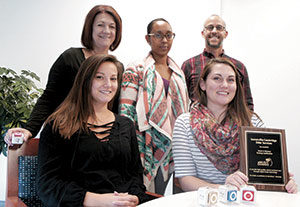
By Nathan Lamb
A growing body of research indicates that music therapy can significantly improve the quality of life for people with dementia. It’s a practice that many are only just learning about, but there’s apparently no shortage of interest in giving it a try, explained Rory Silvia, an operations manager at Somerville-Cambridge Elder Services (SCES).
“Every single client I called said they were willing to try anything, if we thought it would help,” said Silvia.
SCES recently incorporated the Music & Memory program into their range of services available to clients in the Greater Boston area. The grant-funded program uses music to trigger memories and help dementia patients reconnect with the outside world, by providing each participant with an iPod and a tailored playlist of music that’s meaningful to them.
“It’s not just music therapy, it’s personalized music therapy,” said Silvia. “That’s why it’s been so beneficial for people with Alzheimer’s and dementia, because it taps into their memories.”
Program benefits include reduced agitation, increased cooperation with care, and enhanced socialization. Music & Memory has been the subject of numerous studies, including a 2015 report from the Front Porch Center for Innovation and WellBeing that found memory care clients using this intervention saw average mood improvements of more than 38%, with 57% of caregiving staff reporting a more positive outlook and reduced behavioral symptoms of dementia.
The concept was pioneered by Music & Memory founder Dan Cohen, who started the program as a music-loving volunteer in 2006, before scaling things up to non-profit status in 2008. There are currently more than 3,300 certified organizations worldwide, including the Wisconsin Department of Health Services, which provides Music & Memory for more than 100 nursing homes.
Music & Memory is increasingly offered at adult day health and institutional settings, but Silvia said the SCES implementation is unique in Massachusetts- and reflects the agency’s commitment to providing community-based services.
“What we’re doing is a bit different, because we’re bringing Music & Memory to people in their homes, and training the family on how to use it,” she said. “We’ll check-in once per month to see how things are going, but families and volunteers are helping to ensure the clients are using it on a daily basis.”
SCES earned the Music & Memory certification in September, and has since provided iPods for 10 clients. The initial grant provided startup resources to serve more than 100 participants, but Silvia plans to keep things going by soliciting old iPod donations.
“That’s a big part of how a lot of programs sustain their resources,” said Silvia. “”People who have an old iPod they no longer use can donate it and we can repurpose it in a way that’s really meaningful.”
To date, 20 SCES case managers, nurses and social workers have been trained on how to use the program. While the initial effort has focused on clients with Alzheimer’s and dementia, Silvia plans on expanding it to help any SCES client who could benefit – whether they’re coping with depression, cognitive impairments, or could simply use a boost while undergoing dialysis or chemotherapy.
“We want to provide this for our clients and show them how it can help change their lives,” said Silvia.
Silvia is Operations Manager of Adult Family Care, a caregiver-support program that serves much of the Greater Boston Area. For more information about the SCES Music & Memory program, contact Silvia by calling 617-628-2601 or by emailing rsilvia@eldercare.org.















Reader Comments